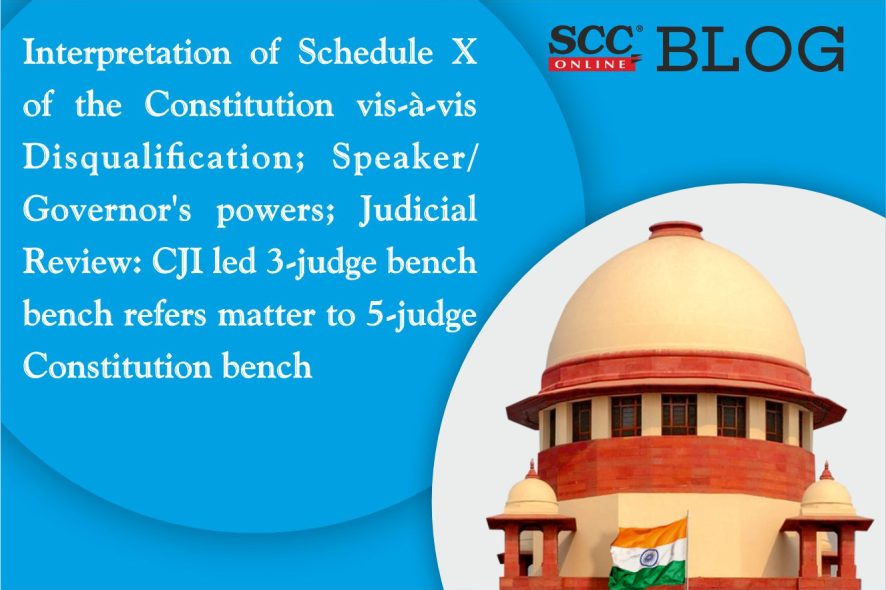Supreme Court: The 3-judge bench of NV Ramana, CJI and Krishna Murari and Hima Kohli, JJ has referred the question relating to interpretation of Schedule X of the Constitution pertaining to disqualification, as well as the powers of the Speaker and the Governor and the power of judicial review thereof, to the 5-judge Constitution bench.
In Nabam Rebia & Bamang Felix v. Deputy Speaker, Arunachal Pradesh Legislative Assembly, (2016) 8 SCC 1, a Constitution bench of this Court held as follows:
“193 We are, therefore, of the view that constitutional purpose and constitutional harmony would be maintained and preserved, if a Speaker refrains from adjudication of a petition for disqualification under the Tenth Schedule, whilst his own position, as the Speaker, is under challenge. This would also, allow the two provisions [Article 179(c) and the Tenth Schedule] to operate in their individual constitutional space, without encroaching on the other.”
The Court observed that this proposition of law laid down by the Constitution bench in Nebam Rebia case, stands on contradictory reasoning, which requires gap filling to uphold the constitutional morality. Hence, this question must be referred to Constitution bench for the requisite gap filling exercise to be conducted.
The Court has, hence, referred the following substantial questions of law relating to the interpretation of the Constitution to the 5-judge Constitution Bench:
- Whether notice for removal of a Speaker restricts him from continuing with disqualification proceedings under Tenth Schedule of the Constitution, as held by this Court in Nebam Rebia case?
- Whether a petition under Article 226 or Article 32 lies, inviting a decision on a disqualification petition by the High Courts or the Supreme Court, as the case may be?
- Can a Court hold that a member is “deemed” to be disqualified, by virtue of his/her actions, absent a decision by the Speaker?
- What is the status of proceedings in the House during the pendency of disqualification petitions against the members?
- If the decision of a Speaker that a member has incurred disqualification under the Tenth Schedule relates back to the date of the action complained of, then what is the status of proceedings that took place during the pendency of a disqualification petition?
- What is the impact of the removal of Paragraph 3 of the Tenth Schedule?
- What is the scope of the power of the Speaker to determine the Whip and the leader of the house legislature party? What is the interplay of the same with respect to the provisions of the Tenth Schedule?
- Are intra-party decisions amenable to judicial review? What is the scope of the same?
- What is the extent of discretion and power of the Governor to invite a person to form the Government, and whether the same is amenable to judicial review?
- What is the scope of the powers of the Election Commission of India with respect to determination of a split within a party?
[Subhash Desai v. Principal Secretary, Governor of Maharashtra, 2022 SCC OnLine SC 1062, order dated 23.08.2022]






